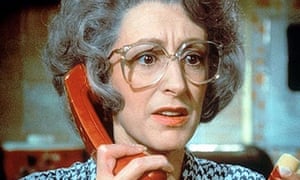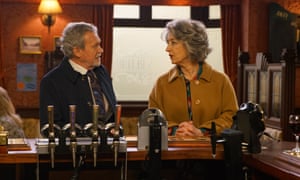I met Maureen Lipman in the most old-fashioned way, over the telephone, to talk about her new role. She’s starring in Martin Sherman’s Rose, which will be available for three nights only – to replicate the sense of theatrical occasion – but online, rather than live. “It’s a story of one woman’s recollection, from the Holocaust to the six-day war, and slightly beyond, and how she comes to make a stand herself, rather than just survive. The play begins and ends with her making a statement about humanity, rather than just on being Jewish or a gentile.”
She’s thrilled about the role – originally made famous by Olympia Dukakis – and makes the point that, by the time you hit 74, parts don’t just end up in your lap. She’s also in Coronation Street, of course, and describes fitting the two filming schedules in with the unsociable hours and the midnight taxis of the actor in high demand. She’s so positive about Sherman’s work, however – “it’s as sensitive, clever, deep and profound a piece as I’ve read” – that you can sense a “but …” coming, and there is one.
“I’d done Martin’s other play, Messiah” – this was 1982 – “and I had an unfortunate experience: somebody in Hampstead stood up and screamed at me. It rattled me. I’ve always been a very confident actress and I never really questioned my confidence on stage, but it did unsettle me as a person. And then, of course, the BT adverts happened around the same time, and it suddenly turned me from a jobbing actress to a Jewish actress.”
That ad had a mysteriously huge impact. Lipman was Beattie, the witty, caustic Jewish grandmother (at one point her son, for reasons I can neither recall nor guess at, refers to her breasts, and she says: “Huh, they moved south about the same time you did”). It was so talked-about that it did rather eclipse her earlier reputation: as a stage talent, a member of both the National Theatre Company and the RSC, Lamda-trained, having grown up in Hull with a tailor father and a fiercely encouraging mother. She was a sitcom favourite in the 70s, early in the genre, and always memorable even in small roles, such as Sylvie in Up the Junction.

Lipman isn’t complaining about being typecast – she’s sprightly and pragmatic on that: “You’re bloody glad to have a good part. Because I’m not going to be in Downton Abbey, am I?” It’s a much more complicated point she’s making, which starts with pigeonholes. “In the last few years, we’re all in little boxes, aren’t we? You have to play what you are. The whole purpose of acting is to play what you’re not.” This lands us, arse over tit, if you’ll forgive the phrase (this whole conversation has brought the 80s rushing back), in the trans debate. “They’re saying, now, nobody can play a person who’s trans unless they are. I’m thinking of Scarlett Johansson, she turned down a trans role because she said it wasn’t fair to take it. And that’s a good choice.
“But we’re in a different timeline, because anybody can play Shylock, and they do. Anybody can play a survivor, and they do.” For all that Lipman is famously outspoken, I can’t work out what she really thinks. Should anybody be allowed to play Shylock? Did Scarlett Johansson make a good choice? “I am all for people fighting for their rights. Of course. But if somebody’s playing a Holocaust survivor, and I’m looking at them on the television and know that they’re not and never have been Jewish, have I got the same right to say, ‘They shouldn’t play that because they’re not?’”
To return to the role of Rose, and Lipman’s audience encounter in Messiah, I wonder whether there isn’t another element to her trepidation about taking on another Sherman play – whether creatively delving into a collective trauma is actually quite traumatic to do. “The early Sherman play was 17th century, so that was a different trauma, they were fleeing a pogrom. But yes, collective trauma is something I’m very aware of. I’m very aware, particularly in my business, of the attitude towards the only Jewish state in the world.”

What a segue: Maureen Lipman is famous for her defence of Israel. She actually reprised Beattie for a video attacking Jeremy Corbyn at the last election, but her falling out with the Labour party went back to the leader before – she was furious with Ed Miliband for supporting a House of Commons motion to recognise Palestine as a state.
While she remains absolutely caustic about a lot of Labour and its works, she admits quite wryly what her relationship was to this party she has so often renounced. “I was a Labour luvvie, with Blair. I wasn’t really a party member.” She talks about all Blair had to deal with, from foot and mouth disease to the death of Princess Diana, to that other thing to do with cows (mad cow disease, we both realise at once), “and he did it with grace, and style, and he did it with gravitas and statesmanship. You had exactly the same situation with him and Campbell as you did with Boris and Cummings. People in power need advisers.”
Does this mean she supports Boris Johnson? It seems like quite a journey from a Labour-ish luvvie to that, and she is laughingly affronted. “I’d have to be stark raving mad to be a supporter of Boris Johnson. And I’m not. I don’t envy him what he wished for, because he got it.”
Yet in any conversation about politics, she remains principally vigilant about Israel; even when it’s miles from the topic, we somehow end up back there. So we jump from Johnson and what a mess he makes, back to the Labour party and whether or not antisemitism has gone away (“you can see it hasn’t”) and suddenly we’re at the explosion in Beirut, which had happened that day. “As soon as Lebanon happened, I can imagine the types that were ready to say, ‘Israel’s on the border, did they, would they, could they?’ I’m very grateful that Hezbollah said they did it.”

Wait, what? It was an accident resulting from political fecklessness, Hezbollah isn’t even the largest party in the Lebanese parliament, and definitely nobody said they did it. She makes a noise as though we’ll just agree to differ.
Lipman’s hardline stance on Israel, she suggests, means that she won’t work with certain actors who support the Palestinian cause. “I won’t be going on tour with The Killing of Sister George with Maxine Peake and Miriam Margolyes, put it that way.”
Peake, sure, would be an impossible acquaintance, after her recent comments – which she retracted – were deemed anti-Israel enough to get Rebecca Long-Bailey kicked off the Labour front bench for retweeting her. But Margolyes, surely, is different. Yes, she vocally supports Palestine, but they’re two character actresses of the same generation (Margolyes is five years older) – they must have gone up for the same parts, been to the same parties for decades; there must be times when they meet and don’t talk about Israel?
“We’ve seen each other at the odd funeral,” she concedes. “I don’t wish her ill. And she’s a very successful leftwing socialist with several houses. Take my point. Need I say more.” Well, not unless you want to … “Most of the stuff that I say is not that dissimilar to her. We’re opinionated women, we’ve got a platform, we tend to spew out the first thing that comes into our fevered little brains. It’s just that, unfortunately, I’m right.”
Lipman is maybe 5% less implacable than she sounds. Asked what she thinks about Keir Starmer, she launches in: “I put in some article that I’ve never been to Ikea and somebody from a newspaper said, would I go for the first time and write about it?” Uh oh, I thought, it’s going to be quite a scramble to get back to the subject from such an extreme mishearing, but the joke was on me. “And I said, I’d go to eye-Keir, and talk to him eye to eye. I’ve not got round to it. I’m very glad he’s there.”
Give or take a quick drive-by attack on John McDonnell and Diane Abbott, this has a mellowing effect on the conversation, and she reverts to the views of the Blair-era luvvie – worried about the future of theatre (“if the rats are eating the velvet, I’m going to be really sad”), mindful of the other side of the coin (“I do think the West End had become moribund. Shows were running for too long and they were tired”), relaxed and self-aware: “A lot of us, it’s very hard to distinguish between wanting a job and wanting to show off. I don’t know the difference, I never have.”















